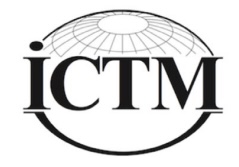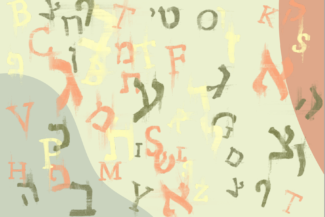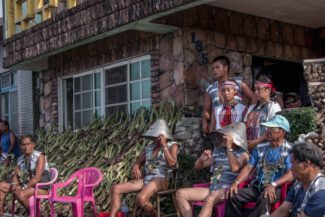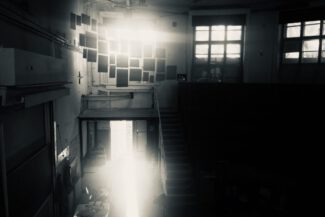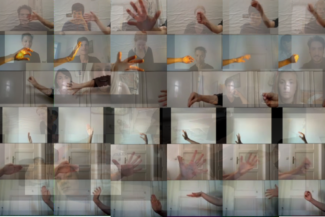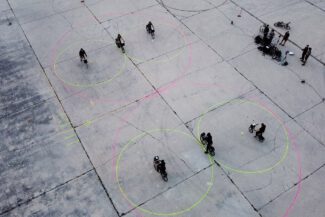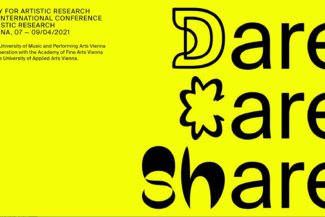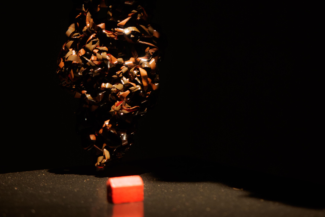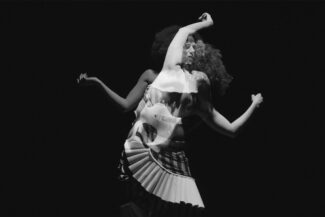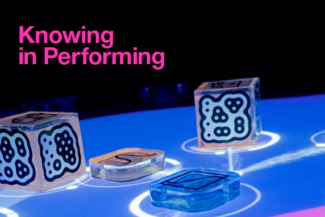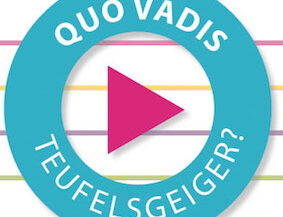Atlas of Smooth Spaces (PEEK project)
- Theoretical framework
In this artistic research project we explore how to notate, communicate and compose space phenomena across audio-corporeal artistic practices. We investigate these in four disciplines: Dance, Rhythmics, Choir Conducting and Direct Sound. They share an awareness for a certain tacit knowledge about space. In stark contrast to musical or movement notations, one finds that notated spaces are rather scarce in the audio-corporeal practices even though space unites them. We argue that this lacuna will be brigded by working on an atlas of space qualities. Rather than communicating merely the metric measures of spaces without the performer, we are concerned instead with emergent spatial qualities of smooth spaces that complement the performer, that exist outside of but not without the performer.
- Hypotheses / Research questions / Objectives
We will compare and contrast each of the four disciplines with one another to investigate how to intensify spatial phenomena, how to translate and communicate them, how to appropriate them for ones own practice and how to engage into mutual composition. We inquire about the kinetic spheres of two performers when a third one enters. Similar to the three-body problem in physics we seek to describe this emergent phenomena. How can the complexified spatial interactions of the kinespheres be notated? How saturated becomes the space, how fragmented, how synchronous?
- Approach /Methods
We conduct experiments during which a smooth space phenomenon is first distilled and condensed to a clear spatial expression. This we call the null-space. It is the starting point for our investigations and experiments, which are co-created in an iterative process by the performers and a complexity scientist. We foresee a recursive pipeline, that divides the work into individual, collision and co-production modes. We also foresee a role fluidity – performer, experimenter and documenter are not attached to individuals allowing for a change of perspective.
- Level of innovation
Acknowledging the importance of spaces in the audio-corporeal arts we consider the development of transdisciplinary space practices and notations as our major innovation. Secondly we believe that the particular mode of collaboration between performers and a complexity scientist leads into new artistic methodologies. Thirdly we create a toolbox that refers to the intense qualities of audio-corporeal space articulations and enlargens the disciplinary range of compositional space factors for artistic productivity.
- Primary staff involved in the project
University of Music and Performing Arts (mdw)
Institute of Dance Arts / Anton Bruckner Private University Linz
Complexity Science HUB Vienna
Alphabetically: Rose Breuss (Dance), William Franck (Direct Sound), Johannes Hiemetsberger (Choir),
Hanne Pilgrim (Rhythmics).
Symposium: ``Performing, Engaging, Knowing``
The entire volume can be viewed on https://zenodo.org/communities/pek, with link to the full-text/video view and download of each paper/video.
Challenging the Theater of Memory. Yiddish Song beyond Kitsch and Stereotype – AR Pilot project
The project “Challenging the Theater of Memory. Yiddish Song beyond Kitsch and Stereotype” attempts to explore and deconstruct the ways that Jewishness is portrayed and embodied in the performance of Yiddish song through ethnographic research and musical performance.
In Germany and in Austria, there are scores of expectations regarding performer, repertoire and the type of Jew represented on stage. Sociologist Michal Y. Bodemann has called this phenomenon, in which Jewish participation in public life fulfills a role on the German post-Nazi national narrative, the Theater of Memory (Bodemann 1996). In the Theater of Memory the diversity and complexity of Jewish life is instrumentalized and reduced to a supporting role in the German or Austrian political narrative. The performance of Yiddish song and more broadly the cultural heritage of Ashkenazi Jews, are not exempt from this phenomenon. Often Yiddish culture and music is portrayed through the nostalgic tropes of traditional shtetl life, stereotypical images of “Ostjuden” and the destruction of the Shoah. Such performances of Yiddish music often reinforce hegemonic narratives rather than creating empowerment for Jewish minorities in Germany and Austria.
In this artistic research project Yiddish musicians and researchers Isabel Frey and Benjy Fox-Rosen reflect on their attempts to challenge the Theater of Memory in their artistic practice. Drawing from their experience of past performances, theory from both performance and Jewish studies as well as ethnomusicology, they develop an artistic performance which weaves together music, texts and visuals. This performance is situated at the center of this artistic research project; it will be presented in multiple settings, and to diverse audiences. The project will be documented through auto-ethnographic (see Bartleet 2021) research methods and audio/visual recordings, published in the Research Catalogue. The final goal of the project is to complete an application for the PEEK program of the FWF in Spring 2023 that will build on and expand upon the topics explored in the present pilot project.
Bartleet, Brydie-Leigh. “Artistic Autoethnography: Exploring the Interface between Autoethnography and Artistic Research.” In Handbook of Autoethnography, edited by Tony E. Adams, Stacy Holman Jones and Carolyn Ellis, pp. 133-145. New York: Routledge, 2021.
Bodemann, Y. Michal. Gedächtnistheater: die jüdische Gemeinschaft und ihre deutsche Erfindung. Hamburg: Rotbuch-Verlag., 1996.
https://musicandminorities.org/projekte/challenging-the-theater-of-memory/
Benjy Fox-Rosen (Los Angeles, 1984) is a musician and researcher based in Vienna, Austria. He is the conductor of the Vienna Stadttempel Choir accompanying Cantor Shmuel Barzilai weekly. As a singer and bass player, Fox-Rosen has performed at Celebrate Brooklyn (USA), the Chicago World Music Festival (USA), Wiener Festwochen (AU), and Krakow Jewish Festival (PL) as well as many other festivals and venues throughout the Americas and Europe. He has taught workshops at the New England Conservatory, Tufts University, the University of Performing Arts Vienna (mdw) and other institutions. As a composer, Fox-Rosen has been commissioned to write works for choirs, artistic interventions, and audio-installations. He has produced three recordings of his own music, two of which were recognized by the Forward in the top-five Jewish music album of the year category.
Fox-Rosen is currently finishing his Masters thesis on the musical practice of the choir of the Stadttempel synagogue at the Institute for Musicology of the University of Vienna. This project uses ethnographic research methods to address questions of musical change, meaning and continuity. Fox-Rosen has also published scholarly reflections on his own artistic practice, focusing on questions of translation in the performance of Yiddish song, particularly in the German speaking world.
Isabel Frey is a Yiddish singer and PhD candidate in the Structured Doctoral Program “Music Matters” at the University of Music and Performing Arts Vienna. She has a background in medical anthropology and sociology, a field that she has also published peer-reviewed articles in. Her current research deals with the politics of Yiddish folksong, the practices of oral transmission and the current developments in creating new Yiddish songs. Her project combines her passion for Yiddish music with the anthropology of the voice and the body and ethnomusicological minority research. It is located between the disciplines of ethnomusicology, cultural studies and gender studies, but also draws on theories from Jewish, Yiddish and diaspora studies. In her PhD project, she also combines her artistic work with her research, conducting ethnographic fieldwork in Yiddish music workshops and master classes that she also received artistic scholarships for. The artistic research pilot project “Challenging the Theater of Memory. Yiddish Song beyond Kitsch and Stereotype” is a further step in this direction to link research with artistic practice.
As a performer, Isabel Frey specializes in Yiddish revolutionary songs and continuing the tradition of Jewish social justice activism both on stages and at political protests. She regularly performs Yiddish music either as a soloist, in the duo Soveles or with the Isabel Frey Trio. She has performed at various international festivals and venues, such as the KlezMORE Festival Bratislava, the Singera Festival in Warsaw or the Willy Brandt Center in Jerusalem. In September 2020 she released her debut album “Millenial Bundist” with Yiddish revolutionary and resistance songs. For the time period of 2023/2024 she has been selected for the New Sound of Austrian Music (NASOM) support program by the Austrian foreign ministry. She has also been interviewed and featured by national and international media such as radio Ö1, ORF2, Deutschlandfunk, Ha’aretz or InGeveb. Additionally, she is the founder and general secretary of the Yiddish cultural association “Friling.”
Creative (Mis)Understandings (PEEK project)
Rotting Sounds - Embracing the temporal deterioration of digital audio (PEEK project)
Most of today’s media output, be it audio or video, is produced and stored in the digital domain. Although digital data are adorned by the myth of lossless transmission and migration, everyday experience does prove the existence of degradation and, ultimately, data loss in various forms. This pertains to the physical nature of storage media and playback devices as well as to media formats and software in the context of their technological infrastructure. The project strives to elaborate on the causes, mechanisms and effects of such deterioration, specifically in the context of digital audio.
Since degradation cannot be avoided on principle, it is our general aim to unearth latent degrees of freedom pertaining to the artistic practice in the omnipresence of decay.
How can degradation effects be understood, actuated, reproduced, directed and harnessed within sound art? Which are the mechanisms and implications of obsolescence concerning hard- and software? How can we model the process of decay in the digital domain, and what are its products and residues? What is the impact of the environment and human interaction? To which extent are artworks products of their material sources or their symptoms of decay?
Social D(ist)ancing – AR Pilot Project
project blog: https://sociald-ist-ancing.blogspot.com/p/pilot.html
RAD Performance – AR Pilot Project
RAD Performance places concerts and sound art on bicycles, in motion and with a multitude of loudspeakers at the centre of artistic research. Under the artistic guidance of Conny Zenk, the project started in July 2020 as an Artistic Research Pilot at the University of Music and Performing Arts Vienna. Based on historical drawings and approaches to participatory, bicycle-related forms of play (Reigenfahren u. Radfahr-Spiele by Josef Adametz, Vienna: Kreisel u. Gröger, 1901), the artistic team (Petra Sturm, Veronika Mayer, Rahel Kraft and Conny Zenk) is developing a choreography for cyclists, as well as graphic notations for musicians as the basis for 6-channel compositions. RAD performers will perform in public spaces using mobile loudspeakers on their bicycles. The acoustic, urban space complements, overlays and expands the electronic composition. At the crossroads of concert, performance and sound art, the bicycle becomes an artistic medium.
Mobile Stage – AR Pilot Project
The Mobile Stage project is the result of a collaboration with Alba Rastl (design), Chiara Bartl-Salvi (performance), Paul Ebhart (sound artist), Felix Huber and Arno Gitschthaler (mechanical engineering). Based on our different artistic practices, we have already been able to realise and present works in previous joint projects. From these experiences, recurring fields of interest have formed, which continue in the current work.
Concept
The interdisciplinary project with the working title “‘Mobile Stage'” combines different components and aspects of classical theatre, such as stage design, performance, sound, and the relationship between viewers and performers. It is a rotating stage that serves both as a performance space and as a sound installation and has been designed that it can be used for various external projects. The work is based on the idea of an inclusive public space and performance as an integral part of everyday public life and sees this as a prerequisite. The inclusion of the environment in this stage body is a central point in the individual disciplines. It has an influence on performance, sound and stage design. So we wanted to make the public space our space of action. Building on the stage body, we become part of the place, transforming and expanding the action space into a stage moment.
Design
In the design, the centre of movement forms a metal tube around which a stage surface moves and rotates the surface moves both on its own axis and up and down in a helical motion. This creates different height ratios and spaces in between.
Independency
Through the institutional independence of the performance space, the project stands for an open space of experience and deliberately opposes the categorised ascribed social classes of the viewing audience. The round shape is supposed to dissolute the classical frontal perception so each viewing side is equal.
Stage design
The rotating stage was designed to be able to change between scenes as quickly as possible. One starting point was the inclusion of the revolving stage as a basic element of movement to which the performers are exposed. Questions of proprioception in relation to moving surfaces come up. How does the body react, how do movements change?
Performative
New choreographies are tested by means of the stage project. The rotating movement of the platform simulates the dancers’ proprioception and dissolves their basic motor skills. New possibilities in movement material and self-perception are developed.
Proprioception – The 6th sense
Proprioception is the perception of the position of one’s own body in space, including the sensation of weight, tension, strength and speed. It is no organ of its own and operates invisibly deep inside the body. Its a product of all the nerve stimuli that our brain constantly receives, especially from muscles and tendons. Proprioception is also about internal sensations that are difficult to recreate. The 6th sense arises from the interaction between our body and our environment, it accompanies us consciously and unconsciously. At a time when our body is being used less and less and is being paralysed due to increasingly sedentary activities, it is good to listen to our proprioception – both in our self-perception and in our interaction with our fellow human beings and our environment.
Synthesis
The Mobile Stage is meant to go to different places to enable different reflections and happenings with its environment. The synthesis between the stage element/sound sculpture/installation and its environment/surroundings/environment as a central research topic on all levels. It is about the relationship between human and environment, as well as between sculpture and environment. (References to Anish Kappor or Dan Grahams’ Octagon for Münster)
Sound
The inclusion of the environment in the object is also an essential point in sound design. The “sonic environment” described by Murray Schaeffer serves as a central concept in dealing with sound. In
the stage, this would be the soundscape, by which the stage is surrounded by. For the development of the piece itself, a soundtrack is planned that will mixed with the “sonic environment”. Modulating effects could be Informations won out of the movement from the stage or the performer. Here we would like to experiment and research. How can movement change sound?
12th SAR International Conference on Artistic Research hosted by mdw
Hosted by mdw – University of Music and Performing Arts Vienna in cooperation with the Academy of Fine Arts Vienna and the University of Applied Arts Vienna
Conference will be hosted as a live online event: from 7th to 9th April 2021.
Deadline for submissions via the Research Catalogue (RC): 30th Sept 2020.
Deadline for registering as full users at the RC: Ten days earlier – 20th Sept 2020.
The 12th SAR International Conference on Artistic Research invites submissions that relates to the three attractors dare, care, and share.
It will be the first SAR conference organized as a live online event. We are calling for artistic researchers to present their work, processes, methods, discoveries, knowledge interventions, new insights, understandings, and to engage in exchange – in actions and words, in complex and simple, conventional and unconventional, robust and fragile ways.
We encourage original contributions that take on the challenge of bringing liveness to this mediated online event. Each contribution shall receive ample discussion time (in real time via video conference).
We will support the following presentation formats:
- Presentation using preproduced material, which will be “presented” and integrated in an interactive online conference;
- Streamed live-performances/demonstrations.
The conference website (including the detailed call and the link to the submission form at the RC) is now online: https://www.sar2021vienna.ac.at
Proceedings/roof exposition:
Book presentation - Knowing in Performing, 16 March 2021
Knowing in Performing. Artistic Research in Music and the Performing Arts
This anthology takes stock of current developments in and reflections on artistic research in music and the performing arts. Thirteen international contributions explore the possibilities of processual knowledge production, taking into account participatory and experimental approaches, and examine their institutional implementation. How can performing be transformed into cognition? What does it mean to think through music, theatre, or dance?
The anthology published by Annegret Huber, Doris Ingrisch, Therese Kaufmann, Johannes Kretz, Gesine Schröder and Tasos Zembylas with transcript is based on contributions to the symposium “Knowing in Performing” in April 2018 as well as to the eponymous lecture series that took place at the mdw – University of Music and Performing Arts Vienna from 2018 to 2020. As part of the book presentation, the dancer, choreographer and artistic researcher Evfa Lilja will read excerpts from her opening statement on the state of artistic research.
Free entrance
PROGRAMME (times are approximate)
4.15-4.30 pm: Open waiting room, Arrival time
4.30-4.45 pm: Welcome & general presentation
4.45-5.00 pm: Short lecture by Efva Lilja (Sweden)
5.00-5.15 pm: Presentation of the book contributions
5.15-5.30 pm: General outlook on artistic research at art universities
5.30-6.00 pm: Discussion
The event is a cooperation of the ARC – Artistic Research Center and mdw’s Research Support Office.
Organisation & Contact:
Karoline Feyertag, Research Support
feyertag@mdw.ac.at
Theresa Dlouhy-Staber, ARC – Artistic Research Center
dlouhy-staber@mdw.ac.at
cover image: Angelicá Castelló – magnetic room
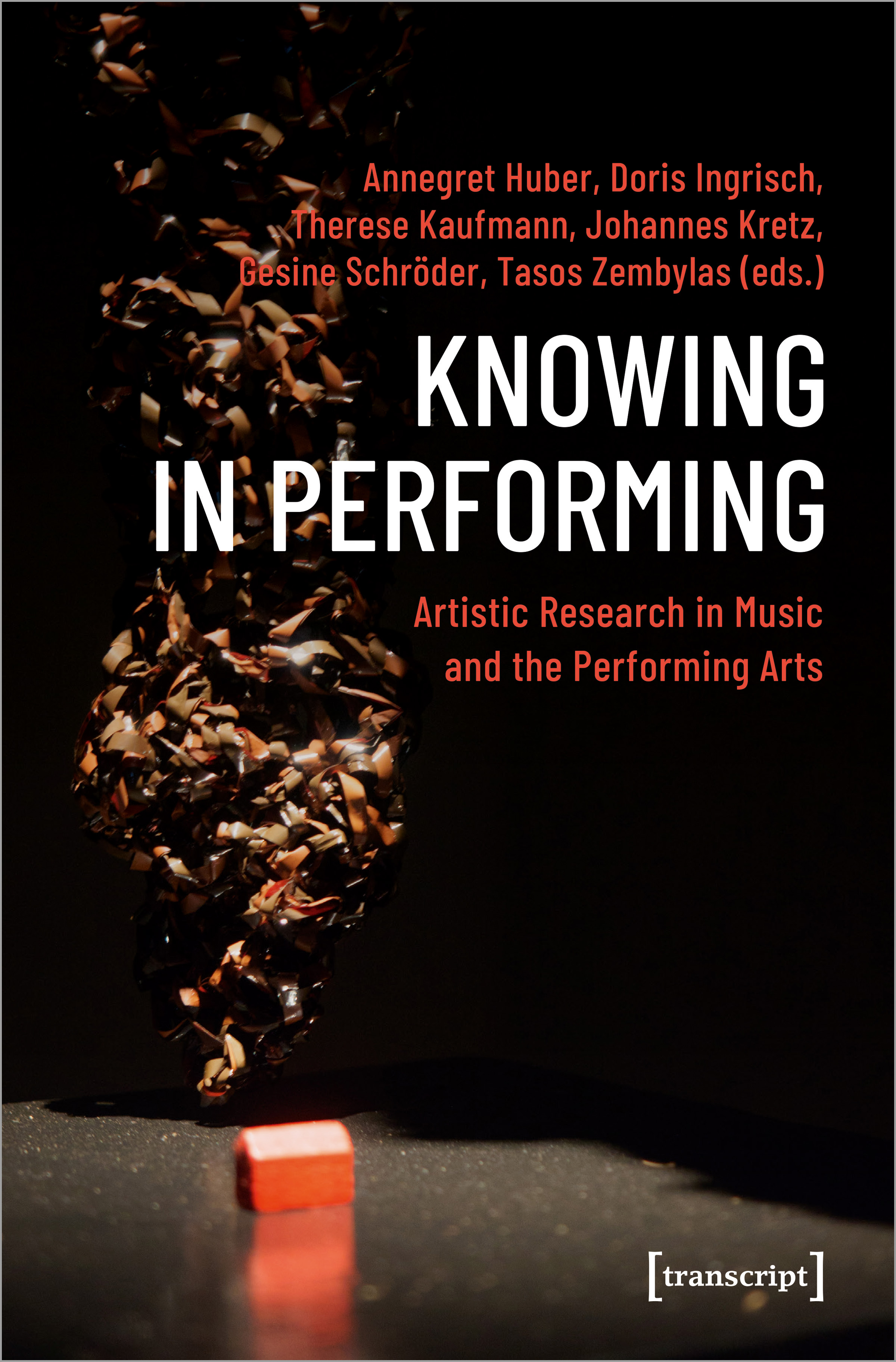
Lecture Series ``Knowing in Performing``
The lecture series “Knowing in Performing” at mdw presented in two years the transdisciplinary dynamics of artistic research with special focus on music and performing arts.
Homepage of the lecture series: “knowing in performing” 2018-2020
Recordings of presentations at Mediathek.
Team
Project team: Johannes Kretz, Therese Kaufmann, Susanne V. Granzer, Annegret Huber, Doris Ingrisch, Johannes Meissl, Gesine Schröder, Tasos Zembylas
Coordination: Karoline Feyertag
Organisation: Slavomíra Martišková
Contact & Information: knowinginperforming@mdw.ac.at
Symposium ``Knowing in Performing``
Artistic research as it has emerged and evolved over the last three decades is related to an increasing interest in epistemological questions as well as an interrogation of how artistic practices constitutively support and instigate processes of knowledge creation. Art is thus being looked at both as an object and a medium of research, becoming part of a general discourse on knowledge regimes and research models.
The symposium investigated this dynamic, ever-renewing field of interrelations with a special focus on the performing arts. Highlighting the issue of various implementation models in curricula and study programmes in higher arts education, it critically analysed international institutional policies and facilitated an open debate on how to integrate current practices and discourses into future teaching and research structures.
4 April 2018, 9.30 am – 6.00 pm
Fanny Hensel Hall
Anton-von-Webern-Platz 1
1030 Vienna
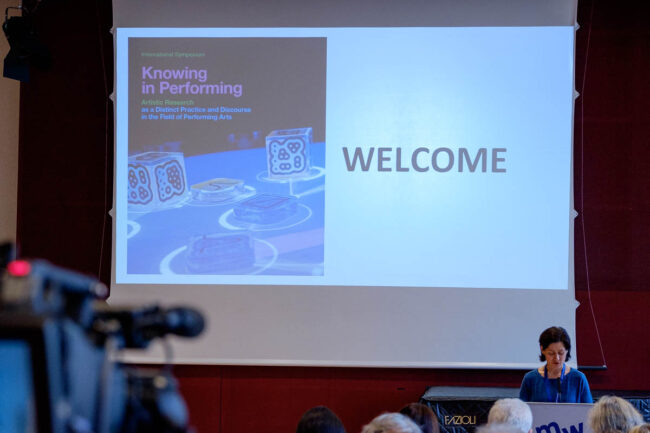
Therese Kaufmann at Knowing in Performing, a symposium for the artistic science, at the MDW. Credits: Gerard Spee
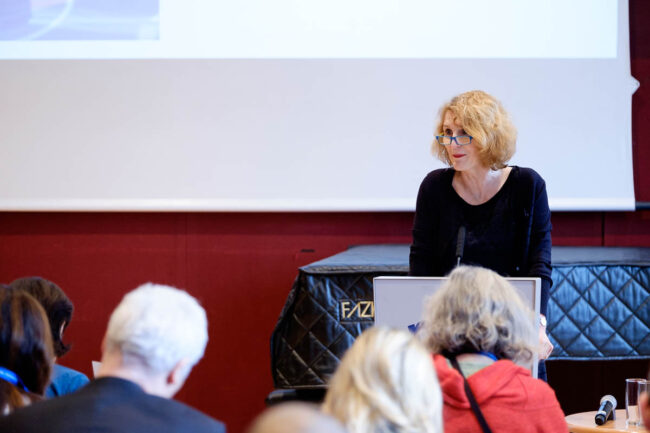
Rector Ulrike Sych at Knowing in Performing, a symposium for the artistic science, at the MDW. Credits: Gerard Spee
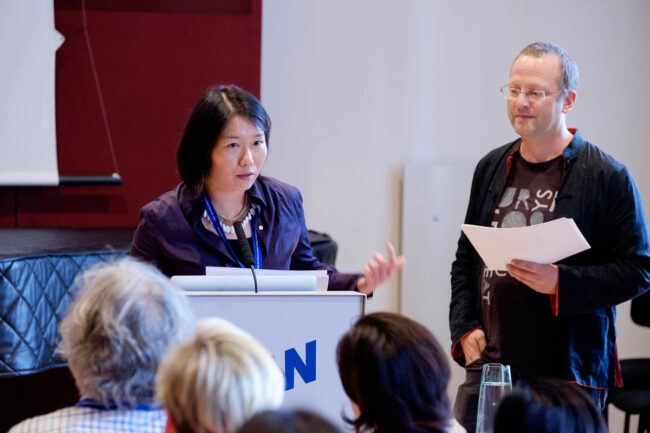
Johannes Kretz and Wei-Ya Lin at Knowing in Performing, a symposium for the artistic science, at the MDW. Credits: Gerard Spee
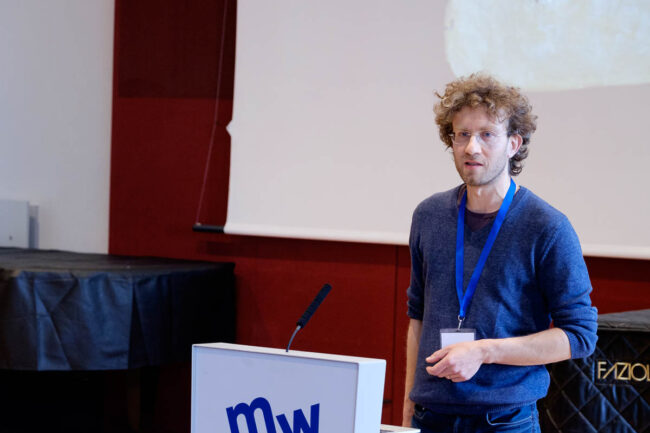
Thomas Grill at Knowing in Performing, a symposium for the artistic science, at the MDW. Credits: Gerard Spee
PEEK Project ``Quo Vadis Teufelsgeiger``
It was the first artistic research project at mdw, supported by FWF / PEEK.

